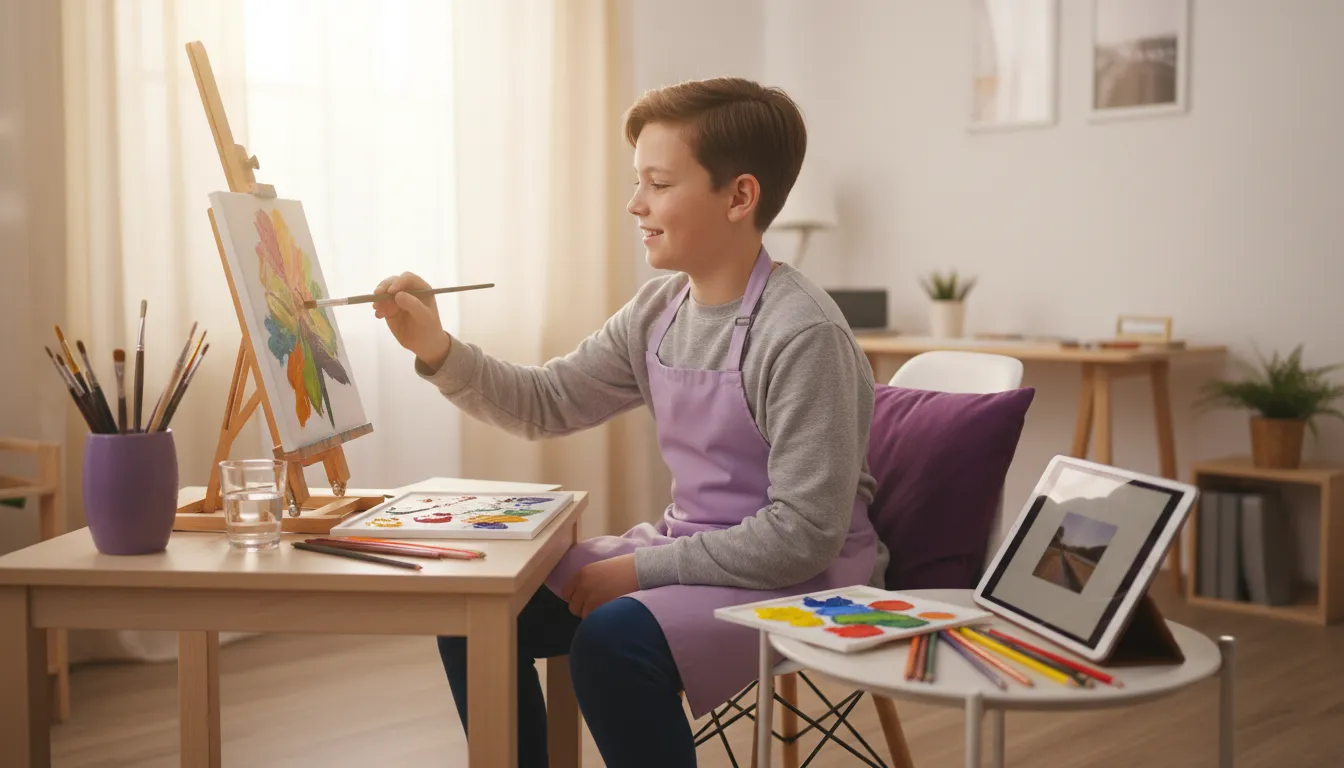Eighth grade is when things start to get real and a little more exciting. Your learner is stepping into their teen years, forming opinions they care deeply about, and craving more independence in how (and what) they learn. They’re starting to see the bigger picture: Why does this matter? How does it connect to real life? Who do I want to be?
This is a year where your homeschool can shift gears, from guiding every step to helping your teen take more ownership. You're not just covering subjects; you're supporting a young person who's beginning to think critically, explore ideas, and build habits that will carry them confidently into high school.
Outschool offers live, interactive classes across all subjects to make it even easier, designed to meet learners exactly where they are and spark excitement.
Building a strong learning foundation
Eighth grade is a big transition year; it’s the bridge between middle school exploration and the deeper dive of high school. It’s the perfect time to strengthen core skills like reading, math, and critical thinking while helping your child grow more independent and confident in their learning. No matter your homeschool style, focusing on depth instead of trying to cover everything can make a big difference.
Math
By eighth grade, math becomes more complex and abstract, preparing learners for high school-level courses like Algebra and Geometry. Learners begin working with linear equations, functions, systems of equations, and transformations. They may also deepen their understanding of exponents, irrational numbers, and volume formulas.
Learners might tackle slope and rate of change, use functions to describe patterns, and explore the relationships between two variables using graphs and tables. They may also start using the Pythagorean Theorem, analyze statistical data sets, and work with scientific notation and square roots, stretching their problem-solving and critical thinking abilities.
- Make algebra visual and interactive: Use graphing tools and digital calculators to plot equations and explore slope, intercepts, and linear relationships in real-time.
- Apply math to real-world contexts: Let learners design a budget, build a blueprint to scale, or analyze data from topics that interest them (like sports stats or environmental data).
- Use hands-on models: Help explain geometric transformations and the Pythagorean Theorem with grid paper, physical models, or interactive simulations.
- Support independent problem-solving: Present open-ended problems and encourage multiple solution strategies. Ask learners to explain their reasoning to strengthen both understanding and communication.
Developing math involves applying knowledge, thinking critically, and preparing to leap into more formal algebra and geometry. With practical applications, interactive tools, and thoughtful discussion, you can help your learner approach this important year with confidence and curiosity.
Language Arts
By this stage, learners read and write more independently and confidently. They may be ready to dig deeper into how texts are built, examining what’s said and how and why it’s written that way. Whether it’s a novel, article, or personal narrative, they notice structure, tone, and perspective more clearly, developing their learning style further.
Your learner might explore themes like identity, justice, or resilience through novels, memoirs, or articles. They’ll practice forming strong arguments, citing evidence, and editing for flow and grammar. The goal isn’t just to “do” language arts; it’s to become confident in expressing ideas clearly and thinking more deeply about what they read and write.
- Let their interests shape reading choices: Offer novels, articles, or podcasts that connect to your child’s passions to spark engagement and thoughtful discussion.
- Make writing real and relevant: Encourage journal entries, opinion pieces about current events, or short stories that reflect their world. Let writing be a tool for reflection, not just an assignment.
- Talk like readers and writers at home: Have open-ended conversations about books, films, or news stories. Ask what your child thinks and why. These chats naturally build analysis and critical thinking skills.
- Use writing as a tool for growth, not perfection: Focus on revising and experimenting instead of getting everything “right” the first time. Writing improves when kids have room to play with ideas and structure.
Eighth grade language arts is all about helping your learner think, question, and communicate more powerfully. With the right mix of freedom and structure, they’ll learn to write purposefully and read with insight.
Science
By middle school, many learners are eager to understand the “why” behind what they observe. Eighth grade science builds on that curiosity with deeper investigations into physical, life, and Earth sciences. They may start exploring topics like atoms and molecules, energy transfer, genetics, and environmental systems, often using real data, experiments, and models to figure things out.
Learners connect big scientific ideas to real-life issues like climate change, technology, and health through hands-on projects, interactive tools, and thoughtful discussions. The goal is to help them think like scientists: asking questions, collecting evidence, and building logical explanations.
- Introduce data and analysis tools: Practice tracking and interpreting experiment results using charts, simple graphs, or beginner-friendly spreadsheets.
- Encourage open-ended exploration: Let your learner investigate topics like environmental science, chemistry in the kitchen, or physics through building projects or guided experiments.
- Connect science to careers: Watch short documentaries, read articles, or interview professionals in STEM fields to help them see science in action.
- Use real-world science challenges: Explore how science helps solve problems, consider energy use, food systems, climate change, or health, and turn it into a mini research or project-based learning experience.
Eighth grade science is about thinking bigger, asking thoughtful questions, solving real-world problems, and seeing how everything connects. With the right mix of challenge, creativity, and curiosity, your learner can explore science in an exciting and empowering way.
Social Studies
In social studies, learners might be ready to move beyond surface-level facts and analyze the "why" behind major events and systems. This year is an opportunity to dig deeper into U.S. history, world events, government, and civic responsibility. Learners could begin connecting historical movements to present-day issues and recognize how different perspectives shape what we know about the past.
At this level, learners develop stronger opinions and can handle thoughtful discussions about fairness, representation, and power. They’re ready to analyze sources for bias, consider whose voices are missing in the story, and explore how geography, economy, and policy intersect. With the right balance of context and creativity, social studies can become one of the most meaningful subjects in your homeschool year.
- Host mock debates or simulations: Try a mock trial, a Congress, or a town hall discussion where learners play roles and argue different sides of an issue. This builds empathy, critical thinking, and communication skills.
- Use historical fiction and documentaries: Pair core history texts with rich media to bring events and cultures to life. A good novel or documentary can create an emotional connection and deepen understanding in a way that textbooks can’t.
- Create multimedia research projects: Let learners choose a topic and present it in a format they enjoy, like a podcast episode, infographic, digital timeline, or video. They’ll retain more when they engage with the material in their own way.
- Explore civics through action: Talk about how laws are made, what it means to vote, or how local governments work. Research real policies or write letters to local leaders on issues your learner cares about.
Social studies at this stage is about helping learners connect the past with the present and see their role in shaping the future. With thoughtful conversations, real-world applications, and opportunities to engage critically, your child can grow into a more informed, empathetic, and empowered thinker.
Enrichment Studies
Eighth grade enrichment subjects allow learners to explore creativity, independence, and real-world skills. Learners may develop stronger opinions, grow their talents, and become curious about how their interests could connect to future goals. Enrichment time can help them stretch in new directions and discover more about who they are and what they love.
From self-directed passion projects to collaborative challenges, enrichment subjects in eighth grade are a chance to go beyond the core subjects and dig into the things that light your learner up. These experiences help sharpen problem-solving, encourage creative risk-taking, and foster meaningful communication skills that matter both in and outside the learning environment.
- Empower independent passion projects: Let your teen pitch and plan a project, like designing a website, composing music, creating a photo series, or researching a topic for a podcast or video.
- Rotate skill-building creative outlets: One week could be spent on graphic design or DIY science experiments, while the next might focus on cooking, budgeting, or creating short stories.
- Use real-world tools and platforms: Try Canva for design, Scratch or Python for coding, or GarageBand for music. Learning these tools now gives them a head start in digital literacy and creative expression.
- Incorporate structured debate or public speaking: Host dinner table debates or assign them a persuasive project.
Enrichment is about letting learners discover their strengths and follow what excites them. When learners are given time to explore and create, they develop confidence, purpose, and real-world skills that support their academic and personal growth. These experiences often become the most memorable parts of their homeschool year.
Helpful Resources
Finding the right resources can make a big difference in keeping your eighth grader engaged, challenged, and excited to learn. These hand-picked options support deeper learning and spark curiosity across every subject area.
Math:
- Outschool’s Math Classes: Outschool offers interactive and engaging math classes that build confidence and support skills. The classes are taught by experienced teachers who make math approachable and fun.
- Illustrative Mathematics (Open Up Resources): A free, standards-aligned curriculum with clear explanations and real-world applications, ideal for learners who benefit from visual models and collaborative problem-solving.
- Prodigy Math Game: A fantasy-style adventure game that makes practicing math fun and motivating, ideal for daily skill-building and reinforcement.
Language arts:
- Outschool’s Language Arts Classes: Outschool’s interactive language arts classes make reading and writing fun through book clubs, essay writing, creative prompts, and literature discussions.
- Brave Writer: A flexible writing program that blends creative expression with gentle guidance, helping kids find their voice and build confidence through meaningful writing experiences.
- CommonLit: A free online resource offering high-quality reading passages with built-in comprehension questions, vocabulary, and writing prompts that align well with middle school standards.
Science:
- Outschool’s Science Classes: Outschool science classes spark curiosity with hands-on experiments and live lessons on chemistry, physics, biology, and environmental science.
- CK-12 Science: A free online platform with interactive simulations, real-world examples, and adaptive lessons in life science, earth science, and physical science.
- MEL Science: A subscription-based kit offering chemistry and physics experiments with real lab tools and VR explanations, perfect for learners who enjoy hands-on learning.
Social studies:
- Outschool’s Social Studies Classes: Engaging social studies classes bring history, government, and global issues to life through discussions, simulations, and creative projects.
- Curiosity Chronicles: A narrative-style history curriculum that invites kids to explore world history through the eyes of curious characters, blending storytelling with maps, timelines, and engaging activities.
- Big History Project: A free, online curriculum that explores history from the Big Bang to modern times, weaving science, history, and global connections together for curious eighth-grade learners.
Enrichment studies:
- Outschool’s Enrichment Classes: Outschool offers a wide range of enrichment classes, from digital art and music production to public speaking, coding, and creative writing.
- Skillshare for Teens: Offers classes in photography, animation, writing, and entrepreneurship, which is excellent for learners ready to explore more advanced creative and real-world topics.
- Tynker: A project-based coding platform where tweens and teens can learn real programming languages, design games, and explore AI and robotics in an engaging, age-appropriate way.
Frequently asked questions (FAQs) about eighth grade homeschooling
Homeschooling eighth grade comes with many exciting opportunities and a few big questions. This section offers answers to help you feel confident every step of the way.
Which subjects do I need to cover in eighth grade?
A well-rounded eighth grade homeschool program usually includes core math, language arts, science, and social studies subjects. Many families also add enrichment areas like art, music, technology, or life skills to keep learning balanced and engaging. These extra touches give your learner space to explore their interests and build confidence in new ways.
How do I know if my child is making good progress?
Progress in homeschooling doesn’t have to look like traditional report cards. You’ll notice growth when your child can explain ideas clearly, solve problems more independently, or show curiosity in new topics. Keep track of their work samples, reading logs, and projects, and have regular check-ins to reflect on what they’ve learned.
What can I do when my learner struggles with certain subjects?
It’s entirely normal for learners to hit roadblocks. Try breaking lessons into smaller steps, switching up your teaching approach, or using hands-on tools like videos, games, or visual aids. Sometimes, a fresh format, like a live class or one-on-one support, can make all the difference in boosting confidence and understanding.
How can I keep learning fun and engaging?
Give your child a voice in their learning. Let them choose reading materials, pick project topics, or explore electives based on their hobbies. Rotate in creative activities like journaling, cooking, or building projects that apply what they’re learning in real-life ways. A flexible schedule, meaningful discussions, and room for curiosity will help keep the energy up all year.
Building your dynamic eighth grade homeschool experience
Eighth grade prepares your learner for the exciting challenges ahead. This year allows your child to fine-tune essential skills, support growing independence, and encourage personal interests that could shape future goals.
Combining strong academics with creative exploration and real-world connections sets the stage for a confident transition into high school. Let your child lead in areas where they’re curious, and support them gently where they need a boost. Outschool offers live, teacher-led classes to guide your learner through this critical and exciting year.






.svg)
.svg)







